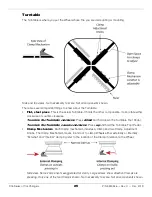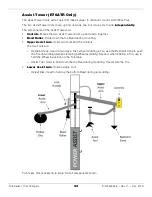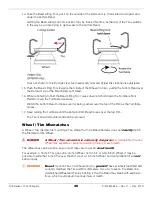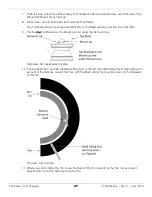
R76 Series of Tire Changers
35
P/N 5900346 — Rev. C — Dec. 2019
Before You Change a Tire
⚠
DANGER
Do not use the Tire Changer unless you have been properly trained and have read
the entire
Installation and Operation Manual
. Tire changing must only be done by
trained, authorized, supervised personnel.
Failure to understand and follow
proper procedures will result in injury or death
.
Before you change a Tire, you should:
•
Remove weights
. Check the Wheel to make sure that all clip-on and adhesive weights (from
having the Tire balanced) have been removed.
•
Deflate the Tire
. This is required.
You must
fully
deflate Tires before demounting
them
.
To make sure a Tire is
fully deflated
, remove the Valve Core from the Valve Stem and then wait for
all of the air to come out. You should use a Valve Core Tool for this, but if you do not have one,
you may be able to use needle-nosed pliers.
•
Have Tire Lubricant ready
. Tire Lubricant makes the process of demounting and mounting
Tires much easier. If you do not use Tire Lubricant, you significantly increase the chances of
damaging the Wheel and the Tire. Tire Lubricant is not provided with the Tire Changer.
•
Check for damage
. Especially with expensive Wheels, make sure to check them for any
damage
before
changing the Tire. Depending on the circumstances, if you find damage you
might want to discuss that damage with the owner of the Vehicle and/or photograph the damage.
If you work in a shop, talk to your Supervisor regarding policies in this area.
Additionally, damaged Wheels and Tires are dangerous to work with. If you are not sure whether a
Wheel or Tire is too damaged to work with, talk to your Supervisor.
•
Understand Performance Wheels
. Before servicing performance Wheels, review the
Performance Wheels section of this manual and your shop’s policies for them.
•
Identify the Narrow Side/Drop Center of the Wheel
. The rule is: the Narrow Side/Drop
Center side of the Wheel gets put onto the Tire Changer facing
up
. For most Wheels, this means
the side of the Wheel facing the
outside
of the Vehicle goes on top, because that’s where the
Narrow Side/Drop Center side is on most (but not all) Wheels.
The following drawing shows two Wheels and identifies the Narrow Side, Drop Center, and Wide
Side of each.
Some aftermarket and OEM performance Wheels are
reverse
drop-center Wheels, meaning the
Narrow Side/Drop Center side of the Wheel is the side closer to the
inside
of the Vehicle. The rule
still holds for these Vehicles: the Narrow Side/Drop Center side of the Wheel gets put onto the Tire
Changer facing up.
•
Ask your Supervisor
. If you have concerns about a Tire you have been asked to demount or
mount, or about how to use the Tire Changer, consult with your Supervisor
before
starting work.
Summary of Contents for R76LT
Page 58: ...R76 Series of Tire Changers 58 P N 5900346 Rev C Dec 2019 Labels...
Page 59: ...R76 Series of Tire Changers 59 P N 5900346 Rev C Dec 2019...
Page 87: ...R76 Series of Tire Changers 87 P N 5900346 Rev C Dec 2019 Maintenance Log...
Page 88: ...1645 Lemonwood Drive Santa Paula CA 93060 USA 2019 BendPak Inc All rights reserved bendpak com...


































